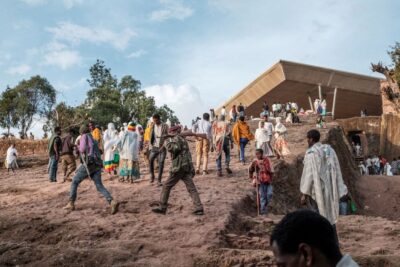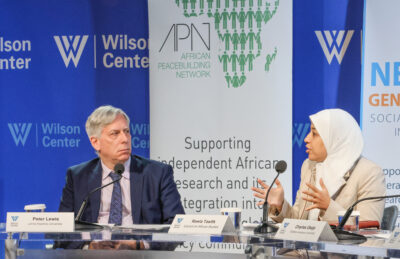Over the past three months, pandemic spread of the novel coronavirus has transformed many of the foundational practices of the social world. These changes have sweeping repercussions for scholarship. For both new and seasoned scholars who are grappling with fieldwork planning, managing the prospect of significantly altered field sites, or beginning new pandemic-inspired projects, Covid-19 has introduced profound uncertainty. Indeed, even after in-person research becomes medically safe, many ethical and methodological challenges will persist. For those of us accustomed to conducting research in spaces affected by violence and conflict, this is very familiar terrain. For conflict researchers, a backdrop of uncertainty is a constant, setting the stage upon which all other plans are produced. We are well acquainted with fieldwork plans collapsing at a moment’s notice, often due to new information or changing security landscapes that force us to rethink how, when, why, and for whom our research is “safe.”
Here, we reflect on four core lessons that our own and others’ conflict research has taught us about conducting research amidst shifting landscapes of risk and vulnerability. In the process, we offer some additional reflections on how we might think through conducting methodologically and ethically sound research, at home and abroad, in the context of the evolving dynamics of Covid-19.
Lesson #1: Crisis exacerbates vulnerability and inequality
“In the best of times, economic precarity elicits new forms of social and political insecurity.”While disease and its spread have long existed alongside violence as saturated sites of intersecting power relations,1 Durham, NC: Duke University Press, 2019More Info → the public health crisis at the core of the Covid-19 pandemic has forced undeniably unequal experiences of governance, healthcare access, and economic security into broad public discourse in new ways. Months of social distancing have left even the wealthiest societies facing an unprecedented employment crisis, with minority communities hardest hit. Elsewhere, the coronavirus has deepened social cleavages and exacerbated vulnerabilities. In the best of times, economic precarity elicits new forms of social and political insecurity. Long-standing racism and xenophobia have also intensified both the visibility and the vulnerability of many individuals as some scramble to blame others for the virus’s origins. These dynamics are likely compounded by fear and loss, as countries’ death tolls continue to climb.
Durham, NC: Duke University Press, 2019More Info → the public health crisis at the core of the Covid-19 pandemic has forced undeniably unequal experiences of governance, healthcare access, and economic security into broad public discourse in new ways. Months of social distancing have left even the wealthiest societies facing an unprecedented employment crisis, with minority communities hardest hit. Elsewhere, the coronavirus has deepened social cleavages and exacerbated vulnerabilities. In the best of times, economic precarity elicits new forms of social and political insecurity. Long-standing racism and xenophobia have also intensified both the visibility and the vulnerability of many individuals as some scramble to blame others for the virus’s origins. These dynamics are likely compounded by fear and loss, as countries’ death tolls continue to climb.
For researchers, confronting the ethical quandary of whether our research questions justify the time, engagement, and commitment relies on individuals’ and institutions’ reflexive investment in probing the scientific and societal value of our work. Particularly for those with the privilege of relative health, wealth, and safety, now is the time to delve more deeply into the political contexts of our studies to ask: What power dynamics are we challenging, reproducing, or reinforcing with our scholarship?
Lesson #2: Fieldwork is fraught in any form
Moments of instability and uncertainty often reinforce existing structures of oppression by providing opportunities for exploitation and self-enrichment. As we know from our work, socioeconomic imbalances can greatly influence dynamics of consent and participation, not only for research participants, but also for those engaged in project implementation.2Kate Cronin-Furman and Milli Lake, “Ethics Abroad: Fieldwork in Fragile and Violent Contexts,” Political Science & Politics 51, no. 3 (2018): 607–614. Particularly in the context of Covid-19, a rush to conduct face-to-face surveys with distressed populations; to monetarily incentivize interviews in victimized communities; or to otherwise collect political data from individuals without critical evaluations of the social and scientific urgency of such work greatly risks elevating researcher priorities over research participants’ current needs. Instead, we might leverage the insights of Lesson #1 to design research that—at minimum—does not exacerbate the precarities that the current pandemic has amplified.
It is already well understood that by moving from one place to another, people, goods and belongings serve as potential vectors for viral transmission. While a desire to minimize the harms of travel may encourage some to outsource fieldwork to local researchers, to move research online, or to turn our attention to events “at home,” we must nevertheless remain aware that vulnerability can and does emerge in any space, event, or community impacted by our research efforts. Similarly, exposing vulnerable populations at home rather than abroad does not solve the attendant ethical question of how we minimize undue risk through the conduct of our research.
“There is a dramatic difference between thoughtfully and intentionally studying online and digital phenomena, and using online interactions as a direct substitute for in-person data collection.”We also caution against the temptation to transition too readily to remote fieldwork as we think anew about the implications of our physical presence in our research. There is a dramatic difference between thoughtfully and intentionally studying online and digital phenomena, and using online interactions as a direct substitute for in-person data collection. It is well known that many countries are using the pandemic as a pretext to consolidate authoritarian control. There are countless known risks associated with conducting telephone surveys and interviews online. These concerns may be especially prescient given an increased reliance on technology, and heightened vulnerabilities that emerge, in the current climate.
Moreover, it is profoundly clear from conducting research on war and violence that intuition goes a long way. Being able to read a room, to remain alert to new emergent risks, and to carefully think through compassion as a political choice are cornerstones of ethically sound and methodologically rich research practice vis-à-vis environments of shifting risk. We encourage all scholars to consider what we are prevented from “noticing,” experiencing, and knowing when we cannot inhabit the spaces occupied by our research partners and participants.3Kanisha D. Bond, “Reflexivity and Revelation,” Qualitative and Multi-Method Research 16, no. 1 (2018): 45–47. Not only does our distance damage our capacity to relate to interlocutors and subjects, and contextualize their stories and concerns, but it also undermines our capacity to understand and analyze our own data.
Lesson #3: Restraint is a professional and ethical requirement
One of the least appreciated lessons from conflict research is that the best scholarship always demonstrates reflexivity and restraint. Research in contexts of shifting risk must be justified, and the benefits of the research must clearly outweigh any potential costs.4Milli Lake, Samantha Majic, and Rahsaan Maxwell, “Research on Vulnerable and Marginalized Populations” (report, Qualitative Transparency Deliberations, Organized Section for Qualitative and Multi-Method Research, American Political Science Association, 2018). Those of us who study conflict are familiar with both the physical risks and the ethical pitfalls of scholars’ increasing attempts to “outdanger” each other in order to gather the flashiest or least accessible data before anyone else.
We are already observing myriad ways in which the pandemic has created perverse incentives for graduate students and junior scholars. Already, faculty are reportedly telling graduate students to “get back to work.” Others have encouraged students to appeal travel bans in order to beat their colleagues back into the field. This advice telegraphs two dangerous messages: (1) that productivity trumps scholars’ safety and wellbeing; and (2) that academic research is a zero-sum game. As we have each seen at work in various conflict zones, these attitudes operate against everyone’s interests and divide intellectual communities. They can also place researchers and their participants and collaborators directly in harm’s way. Incentivizing people to participate in research when they are individually and collectively distracted by lingering illness, job loss, or the death of loved ones will produce poor-quality data. And rushing to generate scholarship when many of our peers cannot fosters competition, exacerbates inequality, and undermines the collective wellbeing of our field.
“Massive, systemic events can take years to play out, and an impetus to hastily take advantage of this opportunity can lead not only to unreliable data, but also to new inequalities and harms.”Caution is also methodologically sound. For scholars of all ranks and tenures, a rush to the “field” risks missing the innumerable ways in which recent events shift our priorities, changing the premise of our work in ways we can’t yet fully understand. Recalling the 2011 Arab Uprisings or the 2016 US election, many rushed to explain what had happened, often over-diagnosing events as they were unfolding. Massive, systemic events can take years to play out, and an impetus to hastily take advantage of this opportunity can lead not only to unreliable data, but also to new inequalities and harms.5Sarah E. Parkinson, “Humanitarian Crisis Research as Intervention,” Middle East Report 290 (Spring 2019): 29–37. This is a useful lesson for the postpandemic era, and one that can be best learned by listening before generating data based on hurriedly conceived hypotheses.
Lesson #4: Empathy matters
The best conflict research centers care and empathy. However, cutting-edge studies of war, contention, and violence also impel scholars not to assume trauma or to pathologize populations. Uniform assumptions of vulnerability strip people of their agency and complexity, and erase modes of resilience and experiences of joy.6 Routledge, 2016More Info → Such tendencies may prevent us from seeing what else is in front of us, because we are singularly focused on harm. Indeed, while many will experience loss and pain in this time, others may uncover new forms of agency or avenues for political mobilization (e.g., via mass protest or community organizing).7→Milli Lake, Ilot Muthaka, and Gabriella Walker, “Gendering Justice in Humanitarian Spaces: Opportunity and (Dis)empowerment Through Gender‐Based Legal Development Outreach in the Eastern Democratic Republic of Congo,” Law and Society Review 50, no. 3 (2016): 539–574.
Routledge, 2016More Info → Such tendencies may prevent us from seeing what else is in front of us, because we are singularly focused on harm. Indeed, while many will experience loss and pain in this time, others may uncover new forms of agency or avenues for political mobilization (e.g., via mass protest or community organizing).7→Milli Lake, Ilot Muthaka, and Gabriella Walker, “Gendering Justice in Humanitarian Spaces: Opportunity and (Dis)empowerment Through Gender‐Based Legal Development Outreach in the Eastern Democratic Republic of Congo,” Law and Society Review 50, no. 3 (2016): 539–574.
→Marie E. Berry, War, Women, and Power: From Violence to Mobilization in Rwanda and Bosnia-Herzegovina (Cambridge University Press, 2018). We must remain attentive to the ways in which subtle and obvious shifts in social relations can subvert (or reinforce) status quo politics, creating new experiences of both empowerment and oppression.
None of this is to say that scholars should refrain from studying the societal and political implications of the pandemic altogether. Rather, we should do so with appropriate consideration of the broader repercussions of our frames, not only for the populations we study, but also for our own communities and colleagues.
Reflections
Experiences of pain, loss, trauma, disillusionment, disorientation, and deep anxiety are likely to resonate with many of us as we transition from life in lockdown to a new sense of “normal.” Leveraging one’s privileges while turning a blind eye to others’ vulnerabilities, however, is not an appropriate response. This moment of rapid change does present researchers with a renewed opportunity to interrogate our own privileges and redress the ways in which our preconceptions distort the questions we ask and the knowledge we produce.8Bond, “Reflexivity and Revelation.” It also likely necessitates the reorientation of projects. It is painful for researchers to abandon a project after they have already expended significant intellectual, emotional, and financial resources. These decisions are harder, and all the more loaded, for PhD students or junior scholars facing intense job insecurity and publication pressure. But such decisions are often the only responsible choice given the risks, especially to research participants and communities.
“We might start by centering the questions and concerns that those at the margins of power—and of academic research—consider to be most relevant and important.”In the context of the impending crisis facing higher education, it is imperative that social science research continues to contribute to our knowledge of the pandemic. After all, it is impossible to fully leverage epidemiological or public health findings without a deep understanding of the social and economic factors that structure transmission, vulnerability, and resilience. If we are serious about generating new and policy-relevant knowledge in this moment, scholars contemplating field-based research in the shadow of the coronavirus should slow down, take stock, and really listen to all who are impacted by and implicated in our work.9Alex Evans, Casper ter Kulle, and Ivor Williams, This Too Shall Pass: Mourning Collective Loss in the Time of Covid-19 (The Collective Psychology Project, 2020). We might start by centering the questions and concerns that those at the margins of power—and of academic research—consider to be most relevant and important. This is the path most likely to improve our collective health, safety, and security through this pandemic and its aftermath.
Banner photo credit: CDC Global/Flickr
References:
→Marie E. Berry, War, Women, and Power: From Violence to Mobilization in Rwanda and Bosnia-Herzegovina (Cambridge University Press, 2018).












